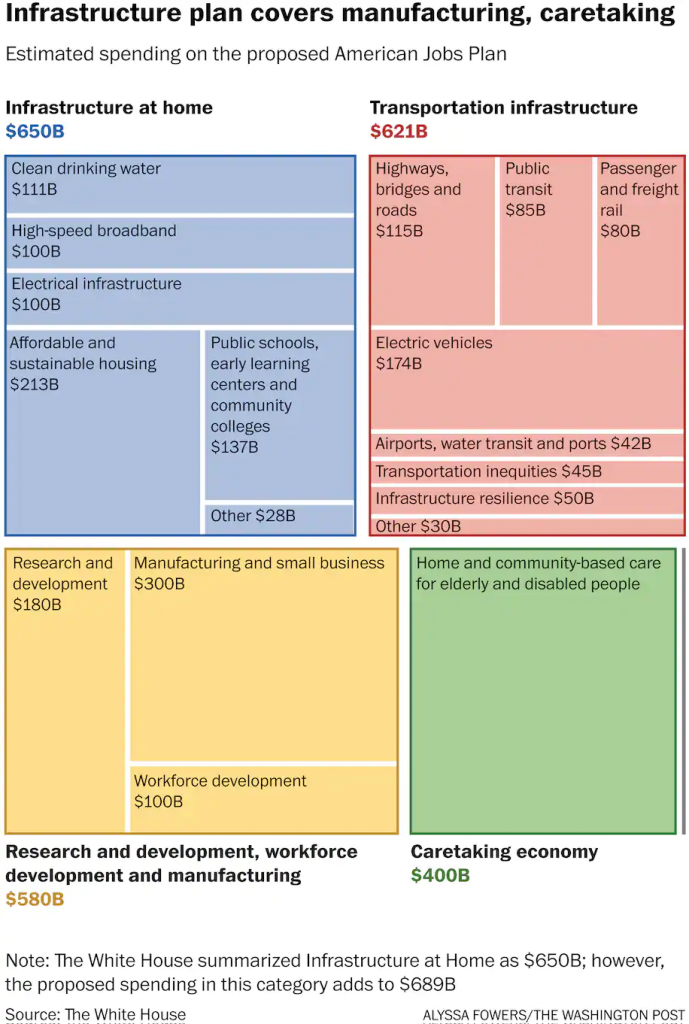
How Biden’s New $2 Trillion Infrastructure Plan Tackles Climate Change
Biden’s newly announced infrastructure plan focuses on electric vehicles, clean energy, and climate change research.
On March 31, President Biden announced his $2 trillion infrastructure plan with a large focus on creating a more sustainable economy. This plan sets the United States on a path to net-zero emissions by 2050. If the plan passes in Congress, it will become one of the largest federal efforts to combat climate change in history. “If we act now, in 50 years people are going to look back and say: ‘This was the moment that America won the future,’” Biden said at a union hall in Pittsburgh.
The infrastructure plan is broken into four main parts: Transportation, Home, Caretaking, and Research. While there are many aspects of the plan dedicated to non-environmental matters, the focus of this blog will be the climate-related policies.

The transportation sector was allocated $621 billion, including $174 billion dedicated to electric vehicles—as they currently only make up approximately 2% of auto sales. This will support half a million new charging stations, tax incentives and rebates for electric car purchases, and new electric school buses (20% of the entire fleet). $46 billion will also be given to government agencies to purchase electric vehicles.
As global warming continues and extreme weather events become more frequent, the plan allocates $115 billion to making roads and bridges more weather resistant. The remainder of the transportation funds will go towards making transit systems, such as airports and Amtrak, more sustainable. Transportation is the largest contributor of greenhouse gases in the U.S., responsible for 29% of emissions each year, so this sector is well deserving of the $621 billion.
The home sector will receive $650 billion from the plan. The largest portion of this, $213 billion, will go towards building and retrofitting over 2 million homes to make them more energy efficient. In addition to roads and bridges mentioned previously, the plan also proposes $100 billion towards making the electrical grid more resilient to weather conditions to prevent crises like the Texas power failure of early 2021.
Biden has proposed an “Energy Efficiency and Clean Electricity Standard” mandate that will require a certain percentage of the U.S. power grid to come from green energy sources such as solar or wind. While this would be a great step for our country, residential emissions are less than half that of transportation, yet the home sector is allocated $30 billion more.
The president also has a goal of ensuring the power sector is 100% emission-free by 2035, but that goal likely requires additional legislation and support. Lastly, $16 billion will be dedicated to cap oil and gas wells and reclaim coal mines to reduce methane leaks. However, the plan does not address existing oil operations or the government’s continued support for oil extraction.
The research sector dedicates $180 billion to research and development focusing on climate change. This includes carbon capture, clean energy, electric vehicles, and emissions reduction. The sector is a large and necessary investment in the future of our country.
The bill falls short in addressing agriculture and regulating large corporations, two major contributors to climate change in the U.S. Many question if the bill is enough to mitigate the worst effects of climate change. However, others suspect it may be difficult to get through Congress because it will be paid for over 15 years by raising the corporate tax rate from 21% to 28%. If passed, Biden’s infrastructure plan will undeniably have a positive impact on our environment.
This insight is a part of our Undergraduate Seminar Fellows’ Student Blog Series. Read work from other students and learn more about the Undergraduate Climate and Energy Seminar.
Skylar Cannon
Undergraduate Seminar FellowSkylar Cannon is a junior in the School of Engineering and Applied Science studying chemical and biomolecular engineering with a minor in energy and sustainability. Cannon is also a 2021 Undergraduate Seminar Fellow.

